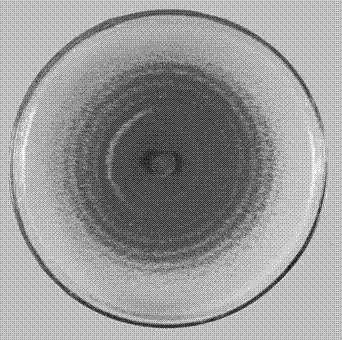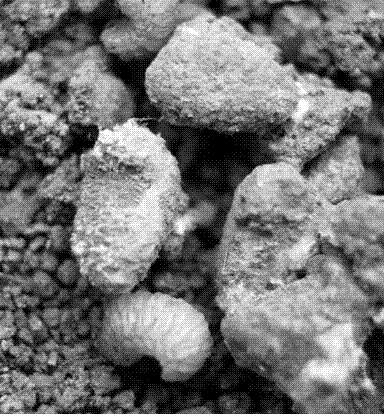A strain of Metarhizium anisopliae for controlling Camellia oleifera larvae and its application
A technology for Metarhizium anisopliae and Camellia oleifera, which is applied in the directions of application, pesticides, fungi and the like, and achieves the effects of strong pathogenicity, good application prospects and good production characteristics
- Summary
- Abstract
- Description
- Claims
- Application Information
AI Technical Summary
Problems solved by technology
Method used
Image
Examples
Embodiment 1
[0022] Metarhizium anisopliae ( Metarhizium anisopliae ) Identification of FJMa201101
[0023] Morphological identification
[0024] Cultivate the isolated and purified Metarhizium anisopliae strain on a flat PPDA medium with a diameter of 90mm at 25±1°C. After 4-5 days, pick a white hyphae preparation and observe the hyphae and meristems of the strain under a microscope Spore peduncle morphology; after 10-12 days, pick mature conidia and make slices to observe the morphology and size of the conidia. Observe and record the morphological characteristics of the colony for about 15 days. The colony texture of this strain is cotton-wool, and the colony is white at the beginning, and gradually expands, and dark green conidia are produced on it and distributed in a ring. Mycelia branched, latticed, colorless and smooth, 2.3μm~3.2μm wide, conidiophores solitary or branched, with 2~5 columnar sporulation cells at the top of the branches, on which basal sporozoites are produced Co...
Embodiment 2
[0034] Metarhizium anisopliae ( Metarhizium anisopliae ) Biological properties of FJMa201101
[0035] Metarhizium anisopliae ( Metarhizium anisopliae ) FJMa201101 was inoculated in the center of the PPDA plate medium, cultured in an incubator at 25±1°C, and the colony diameter was measured once a day by the cross method, with 3 plates (repeated) for each treatment, and observed for 15 days in total. At the same time, record the start time of sporulation. On the 15th day (sporulation is basically over), use a puncher with a diameter of 1.5 cm to punch a small plate from the center of the colony to the edge 1 / 2, take out the plate and place it in a 0.3 ‰ Tween-80 sterile water in the Erlenmeyer flask, shake to fully disperse the spores and properly dilute, measure the concentration of spores with a hemocytometer and convert it into the amount of sporulation per unit area. The determination was repeated three times on each plate, and the average value was taken as the number ...
Embodiment 3
[0040] Metarhizium anisopliae ( Metarhizium anisopliae ) Determination of pathogenicity of FJMa201101 to Camellia oleifera larvae
[0041] Scrape a certain amount of Metarhizium anisopliae from the PPDA plate ( Metarhizium anisopliae ) FJMa201101 spores were placed in sterile 0.3‰ Tween-80 solution, and prepared into 10 7 Spores / mL of spore suspension (the suspension is Metarhizium anisopliae FJMa201101 inoculum); soak healthy Camellia oleifera larvae in the spore suspension for 10 seconds, and then put them back into the sterilized soil in the insect culture box In this method, 30 camellia oleifera larvae were inoculated and repeated 3 times; treated with 0.3‰ Tween-80 sterile aqueous solution as a control. After treatment, place the insect rearing box in a dark 25±1°C constant temperature incubator, observe and record the death of camellia oleifera larvae every day, observe the growth of mycelia and sporulation of the dead insects in moisturizing culture (the growth of b...
PUM
 Login to View More
Login to View More Abstract
Description
Claims
Application Information
 Login to View More
Login to View More - R&D
- Intellectual Property
- Life Sciences
- Materials
- Tech Scout
- Unparalleled Data Quality
- Higher Quality Content
- 60% Fewer Hallucinations
Browse by: Latest US Patents, China's latest patents, Technical Efficacy Thesaurus, Application Domain, Technology Topic, Popular Technical Reports.
© 2025 PatSnap. All rights reserved.Legal|Privacy policy|Modern Slavery Act Transparency Statement|Sitemap|About US| Contact US: help@patsnap.com



